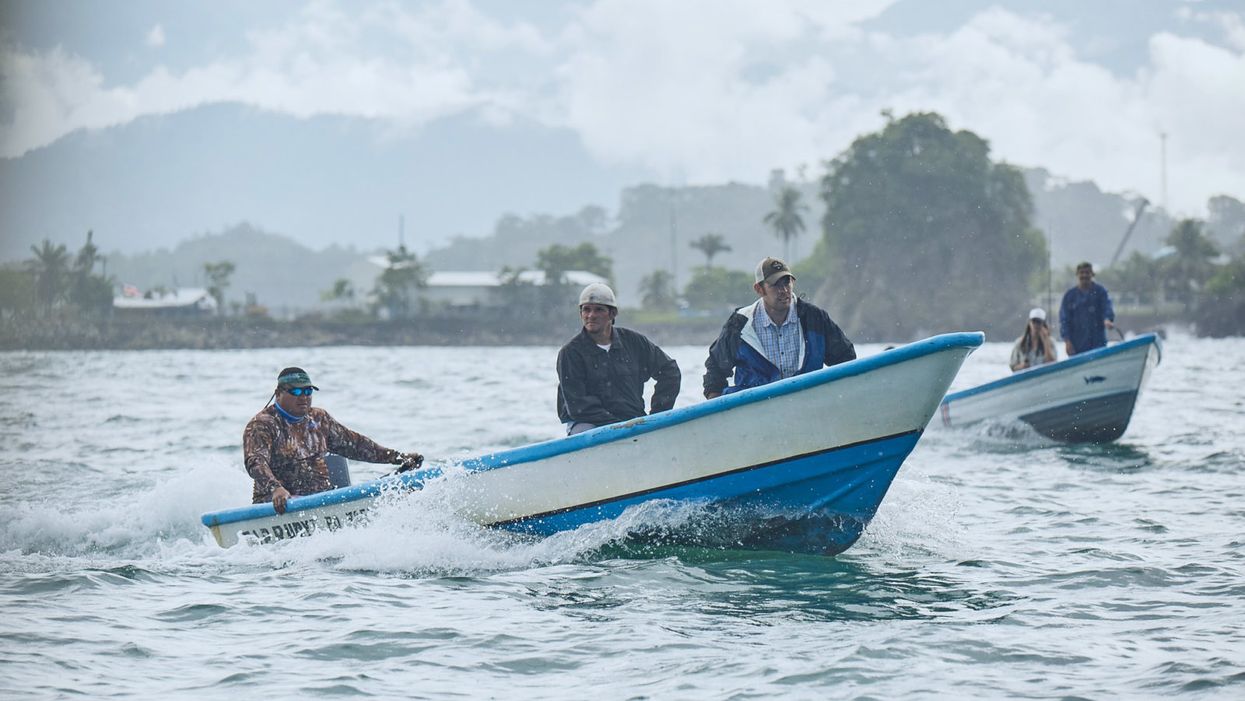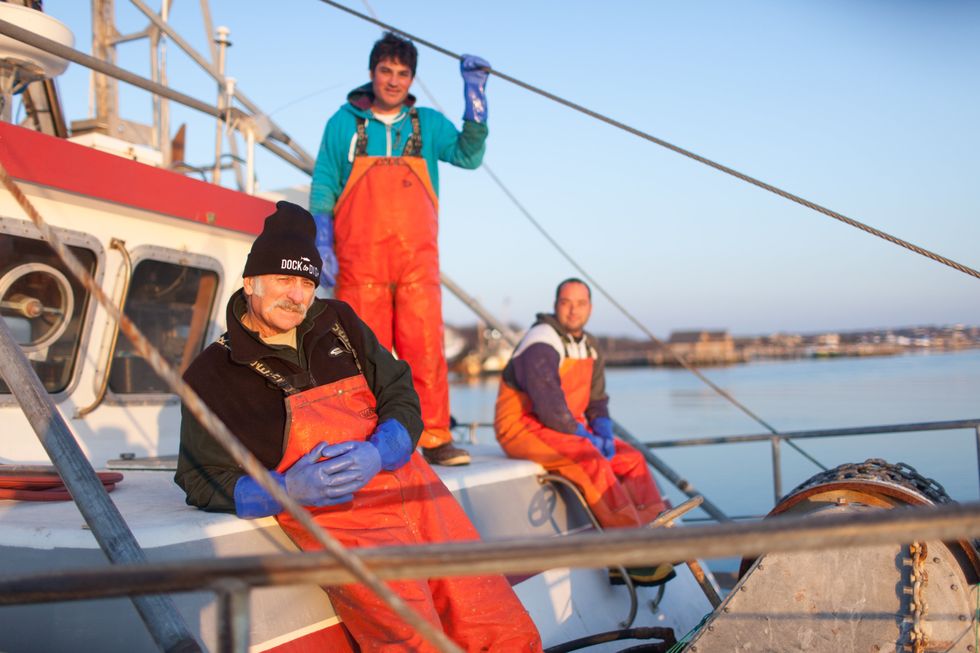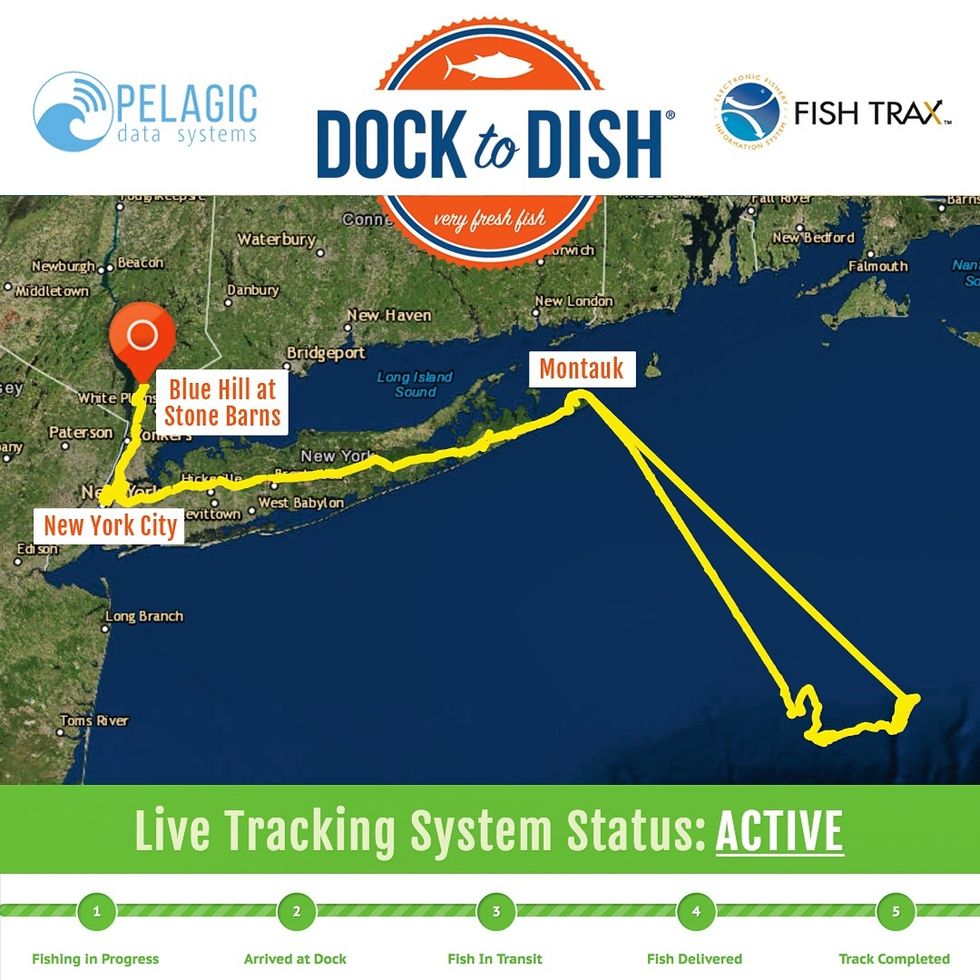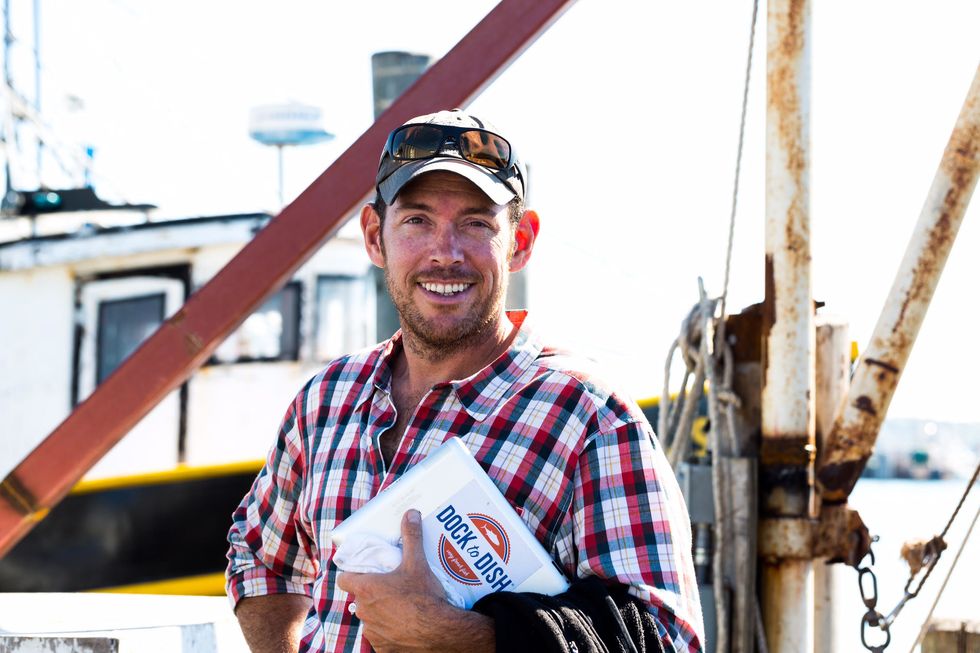Wild-Caught Seafood Has Been Notoriously Shady – Until Now

The Dock to Dish model has expanded across North and Central America. Above, artisanal fishermen on the Pacific coast of Costa Rica head out to sea seeking schools of abundant forage fish to supply the program.
In 2012, entrepreneur Sean Barrett founded Dock to Dish in Montauk, New York. It connected local fishermen and women with local chefs, enabling the chefs to serve hyper-fresh seafood – with the caveat that they didn't know what would be on their menus until it arrived in their kitchens the night before.
"Since we're not a seafood-centric culture, people don't know what's what, where fish are from, and when they're in season, making them easy to dupe."
In June of 2017, The United Nations Foundation designated Dock to Dish as one of the top breakthrough innovations that can scale to solve the ocean's grand challenges. His company has since expanded across the Americas and has just opened up shop in Fiji. Leapsmag recently chatted with Barrett about his inspirations and ideas for how to overcome the hurdles of farming wild seafood. This interview has been edited and condensed for clarity.
What inspired you to start Dock to Dish?
The short story is "A Tale of Two Hills."
The first is Quail Hill Farm in Amagansett. I grew up in the commercial fishing port of Chinicock in the 1980's and 90's, working on my family's dock from an early age and in the restaurant industry in my teens. By my thirties, I had accrued my 10,000 hours of experience in both dock and dish. I watched the food system shift from local to global, especially in seafood. By the early 2000's, over 90 percent of seafood in the U.S. was imported. It was bad.
Quail Hill was the first CSA [Community Supported Agriculture, in which customers pay up front for a share in whatever crops grow (or don't) on the farm that season] in the U.S., founded in 1990. So people in the area were accustomed to getting their produce that way. Scott Chaskey, the poet farmer at Quail Hill, really helped crystallize the philosophy for me and inspired me to apply it to seafood. Fishermen had always been bringing a share of their day's catch to their neighbors; now we were just doing it in a more formalized way.
The second is Blue Hill at Stone Barns. [Executive chef and co-owner] Dan Barber literally trademarked the phrase "Know Thy Farmer"; we just expanded it to Know Thy Fisherman and it took off like a rocket ship. His connections in the restaurant world were also indispensable.

17th generation Montauk fisherman Captain Bruce Beckwith (above left) with crew Charlie Etzel (Center) and Jeremy Gould (right).
Do you have any issues that are unique to seafood that a CSA or meat co-op wouldn't face?
This food is WILD. People are totally disconnected from what that word means, and it makes seafood different from everything else. Everything changes when viewed through the prism of that word.
This is the last wild food we eat. It is unpredictable, and subject to variables ranging from currents and tides to which way the wind is blowing. But it is what makes our model so much more impactful and beneficial than the industrialized, demand-driven marketplace that surrounds us. The ocean and its ecosystem are the boss, not chefs and consumers.
There has a been a lot of press about seafood being mislabeled. How and why does that happen? Can Dock to Dish fix it?
Imported, farmed seafood is cheap. Wild, sustainable seafood is not. People are buying low and selling high to make a buck; and while fisheries are extraordinarily regulated, the marketplace isn't. There is no punishment for mislabeling, and no means to correct it. Since we're not a seafood-centric culture, people don't know what's what, where fish are from, and when they're in season, making them easy to dupe. But technology is poised to fix that; DNA testing can test what a fish sample is and where it's from, and SciO handheld spectrometers – soon to be incorporated into smartphones – can analyze the molecular makeup of anything on your plate.
We've created the first ever live tracking system and database for wild fisheries. It is similar to the electronic system used to monitor commercial fisheries, thanks to which the resurgence of wild seafood in U.S. waters is a model for the rest of the world. We have vessel tracking devices on our fishing boats and delivery vans, so the path of each fish is publicly available in real time.

In 2017, Dock to Dish launched the world's first live "end-to-end" tracking system for wild seafood, which provides full chain transparency and next-generation traceability for members.
People are increasingly looking to seafood as a healthier, possibly more sustainable protein option than meat. Can Dock to Dish scale up to accommodate this potentially growing market?
Nope. We can't scale; the supply is finite. That's why the price keeps going up. To avoid becoming "fish for the rich" we are working closely with Greenwave.org to create a network of 3D restorative ocean farms growing kelp and shellfish, which sequester carbon and nitrogen out of the air and soil. Restorative, because sustainable is no longer an option. In fifty years, a plate of seafood will be mostly ocean vegetables with a small amount of finfish as a garnish.
New implants let paraplegics surf the web and play computer games
Rodney Gorham, an Australian living with ALS, has reconnected with the world, thanks to a brain-machine interface called the Stentrode.
When I greeted Rodney Gorham, age 63, in an online chat session, he replied within seconds: “My pleasure.”
“Are you moving parts of your body as you type?” I asked.
This time, his response came about five minutes later: “I position the cursor with the eye tracking and select the same with moving my ankles.” Gorham, a former sales representative from Melbourne, Australia, living with amyotrophic lateral sclerosis, or ALS, a rare form of Lou Gehrig’s disease that impairs the brain’s nerve cells and the spinal cord, limiting the ability to move. ALS essentially “locks” a person inside their own body. Gorham is conversing with me by typing with his mind only–no fingers in between his brain and his computer.
The brain-computer interface enabling this feat is called the Stentrode. It's the brainchild of Synchron, a company backed by Amazon’s Jeff Bezos and Microsoft cofounder Bill Gates. After Gorham’s neurologist recommended that he try it, he became one of the first volunteers to have an 8mm stent, laced with small electrodes, implanted into his jugular vein and guided by a surgeon into a blood vessel near the part of his brain that controls movement.
After arriving at their destination, these tiny sensors can detect neural activity. They relay these messages through a small receiver implanted under the skin to a computer, which then translates the information into words. This minimally invasive surgery takes a day and is painless, according to Gorham. Recovery time is typically short, about two days.
When a paralyzed patient thinks about trying to move their arms or legs, the motor cortex will fire patterns that are specific to the patient’s thoughts.
When a paralyzed patient such as Gorham thinks about trying to move their arms or legs, the motor cortex will fire patterns that are specific to the patient’s thoughts. This pattern is detected by the Stentrode and relayed to a computer that learns to associate this pattern with the patient’s physical movements. The computer recognizes thoughts about kicking, making a fist and other movements as signals for clicking a mouse or pushing certain letters on a keyboard. An additional eye-tracking device controls the movement of the computer cursor.
The process works on a letter by letter basis. That’s why longer and more nuanced responses often involve some trial and error. “I have been using this for about two years, and I enjoy the sessions,” Gorham typed during our chat session. Zafar Faraz, field clinical engineer at Synchron, sat next to Gorham, providing help when required. Gorham had suffered without internet access, but now he looks forward to surfing the web and playing video games.

Gorham, age 63, has been enjoying Stentrode sessions for about two years.
Rodeny Dekker
The BCI revolution
In the summer of 2021, Synchron became the first company to receive the FDA’s Investigational Device Exemption, which allows research trials on the Stentrode in human patients. This past summer, the company, together with scientists from Icahn School of Medicine at Mount Sinai and the Neurology and Neurosurgery Department at Utrecht University, published a paper offering a framework for how to develop BCIs for patients with severe paralysis – those who can't use their upper limbs to type or use digital devices.
Three months ago, Synchron announced the enrollment of six patients in a study called COMMAND based in the U.S. The company will seek approval next year from the FDA to make the Stentrode available for sale commercially. Meanwhile, other companies are making progress in the field of BCIs. In August, Neuralink announced a $280 million financing round, the biggest fundraiser yet in the field. Last December, Synchron announced a $75 million financing round. “One thing I can promise you, in five years from now, we’re not going to be where we are today. We're going to be in a very different place,” says Elad I. Levy, professor of neurosurgery and radiology at State University of New York in Buffalo.
The risk of hacking exists, always. Cybercriminals, for example, might steal sensitive personal data for financial reasons, blackmailing, or to spread malware to other connected devices while extremist groups could potentially hack BCIs to manipulate individuals into supporting their causes or carrying out actions on their behalf.
“The prospect of bestowing individuals with paralysis a renewed avenue for communication and motor functionality is a step forward in neurotech,” says Hayley Nelson, a neuroscientist and founder of The Academy of Cognitive and Behavioral Neuroscience. “It is an exciting breakthrough in a world of devastating, scary diseases,” says Neil McArthur, a professor of philosophy and director of the Centre for Professional and Applied Ethics at the University of Manitoba. “To connect with the world when you are trapped inside your body is incredible.”
While the benefits for the paraplegic community are promising, the Stentrode’s long-term effectiveness and overall impact needs more research on safety. “Potential risks like inflammation, damage to neural tissue, or unexpected shifts in synaptic transmission due to the implant warrant thorough exploration,” Nelson says.
There are also concens about data privacy concerns and the policies of companies to safeguard information processed through BCIs. “Often, Big Tech is ahead of the regulators because the latter didn’t envisage such a turn of events...and companies take advantage of the lack of legal framework to push forward,” McArthur says. Hacking is another risk. Cybercriminals could steal sensitive personal data for financial reasons, blackmailing, or to spread malware to other connected devices. Extremist groups could potentially hack BCIs to manipulate individuals into supporting their causes or carrying out actions on their behalf.
“We have to protect patient identity, patient safety and patient integrity,” Levy says. “In the same way that we protect our phones or computers from hackers, we have to stay ahead with anti-hacking software.” Even so, Levy thinks the anticipated benefits for the quadriplegic community outweigh the potential risks. “We are on the precipice of an amazing technology. In the future, we would be able to connect patients to peripheral devices that enhance their quality of life.”
In the near future, the Stentrode could enable patients to use the Stentrode to activate their wheelchairs, iPods or voice modulators. Synchron's focus is on using its BCI to help patients with significant mobility restrictions—not to enhance the lives of healthy people without any illnesses. Levy says we are not prepared for the implications of endowing people with superpowers.
I wondered what Gorham thought about that. “Pardon my question, but do you feel like you have sort of transcended human nature, being the first in a big line of cybernetic people doing marvelous things with their mind only?” was my last question to Gorham.
A slight smile formed on his lips. In less than a minute, he typed: “I do a little.”
Leading XPRIZE Healthspan and Beating Negativity with Dr. Peter Diamandis
XPRIZE founder and chairman Peter Diamandis launches XPRIZE Healthspan at an event on November 29.
A new competition by the XPRIZE Foundation is offering $101 million to researchers who discover therapies that give a boost to people aged 65-80 so their bodies perform more like when they were middle-aged.
For today’s podcast episode, I talked with Dr. Peter Diamandis, XPRIZE’s founder and executive chairman. Under Peter’s leadership, XPRIZE has launched 27 previous competitions with over $300 million in prize purses. The latest contest aims to enhance healthspan, or the period of life when older people can play with their grandkids without any restriction, disability or disease. Such breakthroughs could help prevent chronic diseases that are closely linked to aging. These illnesses are costly to manage and threaten to overwhelm the healthcare system, as the number of Americans over age 65 is rising fast.
In this competition, called XPRIZE Healthspan, multiple awards are available, depending on what’s achieved, with support from the nonprofit Hevolution Foundation and Chip Wilson, the founder of Lululemon and nonprofit SOLVE FSHD. The biggest prize, $81 million, is for improvements in cognition, muscle and immunity by 20 years. An improvement of 15 years will net $71 million, and 10 years will net $61 million.
In our conversation for this episode, Peter talks about his plans for XPRIZE Healthspan and why exponential technologies make the current era - even with all of its challenges - the most exciting time in human history. We discuss the best mental outlook that supports a person in becoming truly innovative, as well as the downsides of too much risk aversion. We talk about how to overcome the negativity bias in ourselves and in mainstream media, how Peter has shifted his own mindset to become more positive over the years, how to inspire a culture of innovation, Peter’s personal recommendations for lifestyle strategies to live longer and healthier, the innovations we can expect in various fields by 2030, the future of education and the importance of democratizing tech and innovation.
In addition to Peter’s pioneering leadership of XPRIZE, he is also the Executive Founder of Singularity University. In 2014, he was named by Fortune as one of the “World’s 50 Greatest Leaders.” As an entrepreneur, he’s started over 25 companies in the areas of health-tech, space, venture capital and education. He’s Co-founder and Vice-Chairman of two public companies, Celularity and Vaxxinity, plus being Co-founder & Chairman of Fountain Life, a fully-integrated platform delivering predictive, preventative, personalized and data-driven health. He also serves as Co-founder of BOLD Capital Partners, a venture fund with a half-billion dollars under management being invested in exponential technologies and longevity companies. Peter is a New York Times Bestselling author of four books, noted during our conversation and in the show notes of this episode. He has degrees in molecular genetics and aerospace engineering from MIT and holds an M.D. from Harvard Medical School.
Show links
- Peter Diamandis bio
- New XPRIZE Healthspan
- Peter Diamandis books
- 27 XPRIZE competitions and counting
- Life Force by Peter Diamandis and Tony Robbins
- Peter Diamandis Twitter
- Longevity Insider newsletter – AI identifies the news
- Peter Diamandis Longevity Handbook
- Hevolution funding for longevity

XPRIZE Founder Peter Diamandis speaks with Mehmoud Khan, CEO of Hevolution Foundation, at the launch of XPRIZE Healthspan.
Hevolution Foundation


